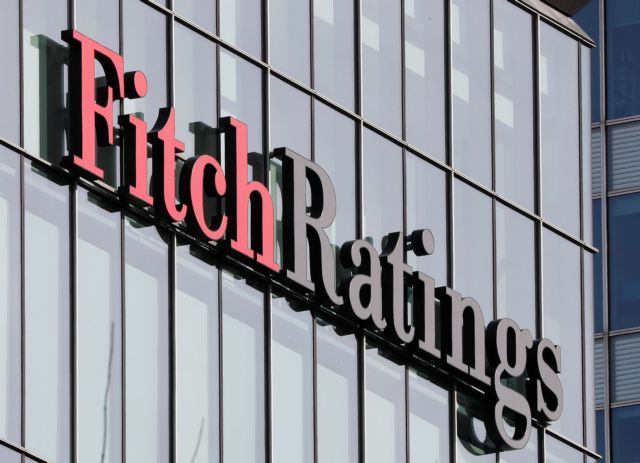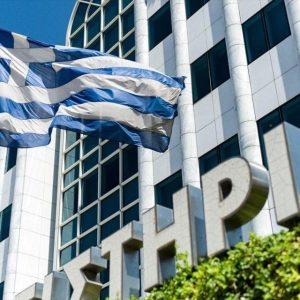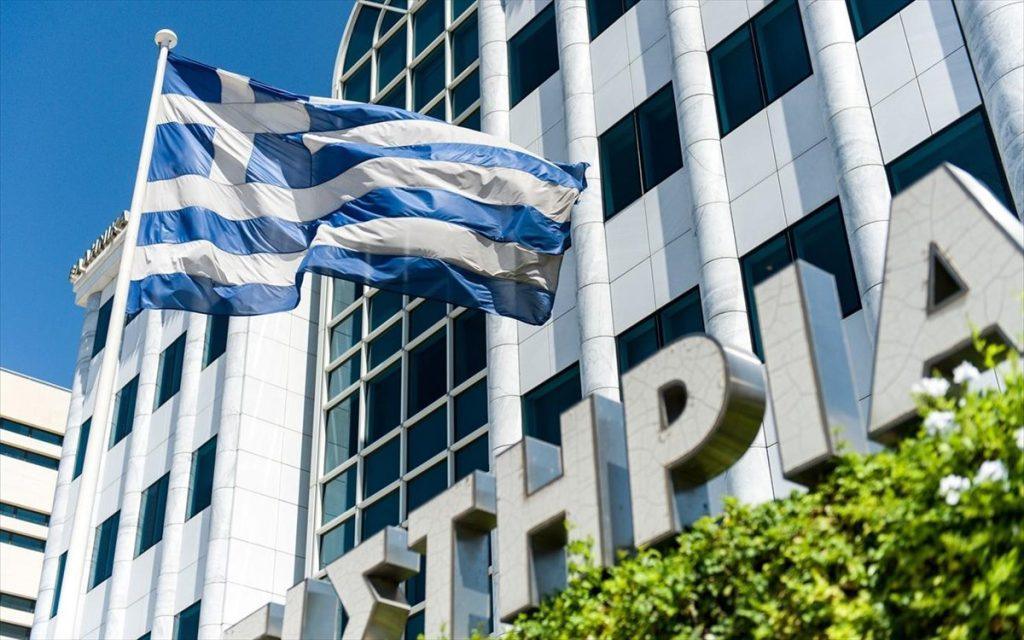Fitch Ratings revised the Outlook on Greece’s Long-Term Foreign-Currency Issuer Default Rating (IDR) to Positive from Stable and affirmed the IDR at ‘BB’.
The revision of the Outlook on Greece’s ratings reflects the following key rating drivers and their relative weights: Strong economic growth dynamics and a falling fiscal deficit will support a faster than expected decline in public sector indebtedness, in the context of low current and expected borrowing costs. Greek banks have made substantial progress on asset quality improvement, sharply reducing the level of non-performing loans (NPLs) in the banking sector and enhancing their ability to provide credit to the real economy.
Economic activity in Greece has recovered at a faster pace than Fitch expected at the time of the previous rating review in July 2021. Fitch estimates that real GDP growth for the year as a whole was 8.3%, substantially higher than our July forecast of 4.3%. Real GDP growth in 1Q-3Q21 was 9.5% compared with the corresponding period in 2020, and the level of real GDP in 3Q21 was estimated to be around 1% above the pre-pandemic level of 4Q19.
Fitch expects the recovery in economic activity to continue in 2022, as the deployment of the NGEU funds gathers pace, and for the economy to expand by a further 4.1%, with a similar growth rate forecast for 2023. The grants component included in Greece’s Recovery and Resilience Plan (RRP) amounts to around EUR18 billion (just under 10% of 2019 nominal GDP), to be disbursed over six years. The pandemic represents a short-term risk to economic activity, in Fitch’s view. Coronavirus infections in Greece rose substantially in autumn, and at a sharper rate more recently with the spread of the Omicron variant. The Greek government has introduced some restrictions and these could weigh on economic activity. A further risk to our projections would be a delayed implementation of investment projects envisaged by the RRP.
The combination of stronger than expected economic growth and a reduction in the government deficit driven by a substantial reduction in pandemic-related support will support a decline in government debt as a share of GDP. We estimate that the debt ratio fell to 198.4% in 2021 from 206.3% in 2020, and we forecast that it will decline to 190.3% this year and then 185.3% by end-2023.
Greece will repay outstanding loans from the IMF in 2022, and prepay the 2022 and 2023 instalments of loans from the Greek Loan Facility, the first financial support programme for Greece agreed in 2010. Overall, these payments will amount to EUR7.2 billion (around 3.8% of forecast GDP), and we assume that around half of this will funded from cash reserves. European Central Bank (ECB) monetary policy supports financing conditions.
The largest Greek banks have continued to improve their asset quality metrics through securitisations backed by the Hercules Asset Protection Scheme and other portfolio sales. The government extended this scheme in April 2021 for an extra 18 months to October 2022, increasing the envelope for guarantees offered for these operations. The overall level of NPLs fell sharply over 2021, to EUR20.9 billion in 3Q21 from EUR60 billion a year earlier. The NPL ratio declined to 15.0% from 36.3% over the same period. We expect the banking sector’s asset quality metrics to improve further this year, although there are risks of new inflows of impaired loans, especially from more vulnerable borrowers still benefiting from forbearance measures or state support.
Greece’s ‘BB’ rating also reflects the following key rating drivers:
Greece has high income per capita that far exceeds both the ‘BB’ and ‘BBB’ medians. Governance scores and human development indicators are among the highest of sub-investment grade peers. These strengths are set against still very high levels of NPLs and very large stocks of public and external debt.
Public indebtedness rose sharply due to the pandemic, and the debt stock will remain very large for a prolonged period. In 2023, the debt ratio is forecast to be the second-highest of Fitch-rated sovereigns, and more than 3x the ‘BB’ median forecast (56.0% of GDP). At the same time, there are mitigating factors that support public debt sustainability, in our view. Greece’s liquid asset buffer is substantial (around 18% of GDP at end-2021); the concessional nature of the majority of Greek sovereign debt means that debt-servicing costs are low (the interest-to-revenue forecast for this year is 5.6%, compared with the ‘BB’ median forecast of 9.7%) and amortisation schedules are manageable. The average maturity of Greek debt is among the longest of any sovereign, at 20.5 years. Moreover, the debt stock is mostly fixed rate, limiting the risk from interest rate rises.
The inclusion of Greek government bonds in the ECB’s pandemic emergency purchase programme (PEPP) has been an important source of financing flexibility, helping to keep bond yields down. By end-November, the ECB had bought EUR34.9 billion (19.4% of forecast 2021 GDP) of Greek government bonds. In December the ECB stated that while PEPP net purchases will cease from the end of March, the period for re-investing maturing bonds would be lengthened by one year to end-2024. Moreover, the ECB said that PEPP reinvestments can be adjusted in periods of market stress and Greek bonds can be purchased over and above the rollovers of redemptions.
Notwithstanding the strong recovery in economic activity, we estimate that the general government deficit in 2021 declined only slightly to 9.7% of GDP from 10.1% in 2020 (BB median estimate: 5.2% of GDP). The persistence of an elevated deficit was due to the continued pandemic-related support provided by the government to the private sector, amounting to EUR15.6 billion (8.7% of forecast 2021 GDP). The continued economic recovery and the phasing out of pandemic-related support measures will bring about a sharp reduction in the government deficit, to 4.1% of GDP. We expect a further reduction in the deficit to follow in 2023, to 2.9% of GDP.
Tourist arrivals in Greece picked up substantially after the loosening of coronavirus-related restrictions in 2Q21, with the number of arrivals in 3Q21 around 56% of 2019 totals. This implies that the current account deficit for 2021 will be lower than we expected last July (a revised estimate of 4.4% of GDP compared with 5.7%). At the same time, we do not expect the current account to improve over the next two years. Domestic demand-driven growth will imply strong import growth, offsetting the recovery in export sectors including tourism. Net external indebtedness has fallen back from its 2020 peak, but remains high (2021 estimate of just under 150% of GDP: ‘BB’ median, 18.4%).
ESG – Governance: Greece has an ESG Relevance Score (RS) of ‘5[+]’ for both Political Stability and Rights and for the Rule of Law, Institutional and Regulatory Quality and Control of Corruption. These scores reflect the high weight that the World Bank Governance Indicators (WBGI) have in our proprietary Sovereign Rating Model. Greece has a medium WBGI ranking at 65.7 reflecting a recent track record of peaceful political transitions, a moderate level of rights for participation in the political process, moderate institutional capacity, established rule of law and a moderate level of corruption.RATING SENSITIVITIES
Factors that could, individually or collectively, lead to negative rating action/downgrade:
-Public Finances: Failure to reduce government debt/GDP over the short term, for example due to higher than expected deficits or weak economic performance.
-Macro: Renewed adverse shocks to the Greek economy affecting the economic recovery or Greece’s medium-term growth potential.
– Structural Features: Adverse developments in the banking sector increasing risks to the public finances and the real economy, via the crystallisation of contingent liabilities on the sovereign’s balance sheet and/or an inability to undertake new lending to support economic growth.Factors that could, individually or collectively, lead to positive rating action/upgrade:
– Public Finances: Confidence in a firm downward path for the government debt/GDP ratio resulting from lower deficits, robust GDP growth and sustained low costs of borrowing.
-Structural: Continued progress on asset-quality improvement by systemically important banks, consistent with successful completion of securitisation transactions and lower impairment charges, and leading to improved credit provision to the private sector
-Macro: An improvement in medium-term growth potential and performance following the Covid-19 shock, particularly if supported by the implementation of the EU Recovery Plan and other structural reforms
SOVEREIGN RATING MODEL (SRM) AND QUALITATIVE OVERLAY (QO)
Fitch’s proprietary SRM assigns Greece a score equivalent to a rating of ‘BB’ on the Long-Term Foreign-Currency (LT FC) IDR scale.
Fitch’s sovereign rating committee adjusted the output from the SRM score to arrive at the final LT FC IDR by applying its QO, relative to SRM data and output, as follows:
– Structural: -1 notch, to reflect weaknesses in the banking sector, including a very high level of NPLs, which represent a contingent liability for the sovereign, and a constraint on credit provision to the private sector.
– Public Finances: +1 notch, to reflect the manageable amortisation schedule, long average maturity of debt, and the high degree of financing flexibility compared with rated peers’. Financing flexibility is enhanced by ECB monetary policy and has improved following the inclusion of Greek government bonds in the PEPP, resulting also in historically low market interest rates. Greece’s access to NGEU funds also enhances financing flexibility relative to ‘BB’ category-rated peers’.
































![ΕΒΕΠ: Οι επιπτώσεις από μια δυσμενή εξέλιξη του «δασμολογικού πολέμου» μεταξύ ΗΠΑ – ΕΕ [γράφημα]](https://www.ot.gr/wp-content/uploads/2025/07/ot_trump_EE25-1200x703-1-1024x600-1.jpg)





